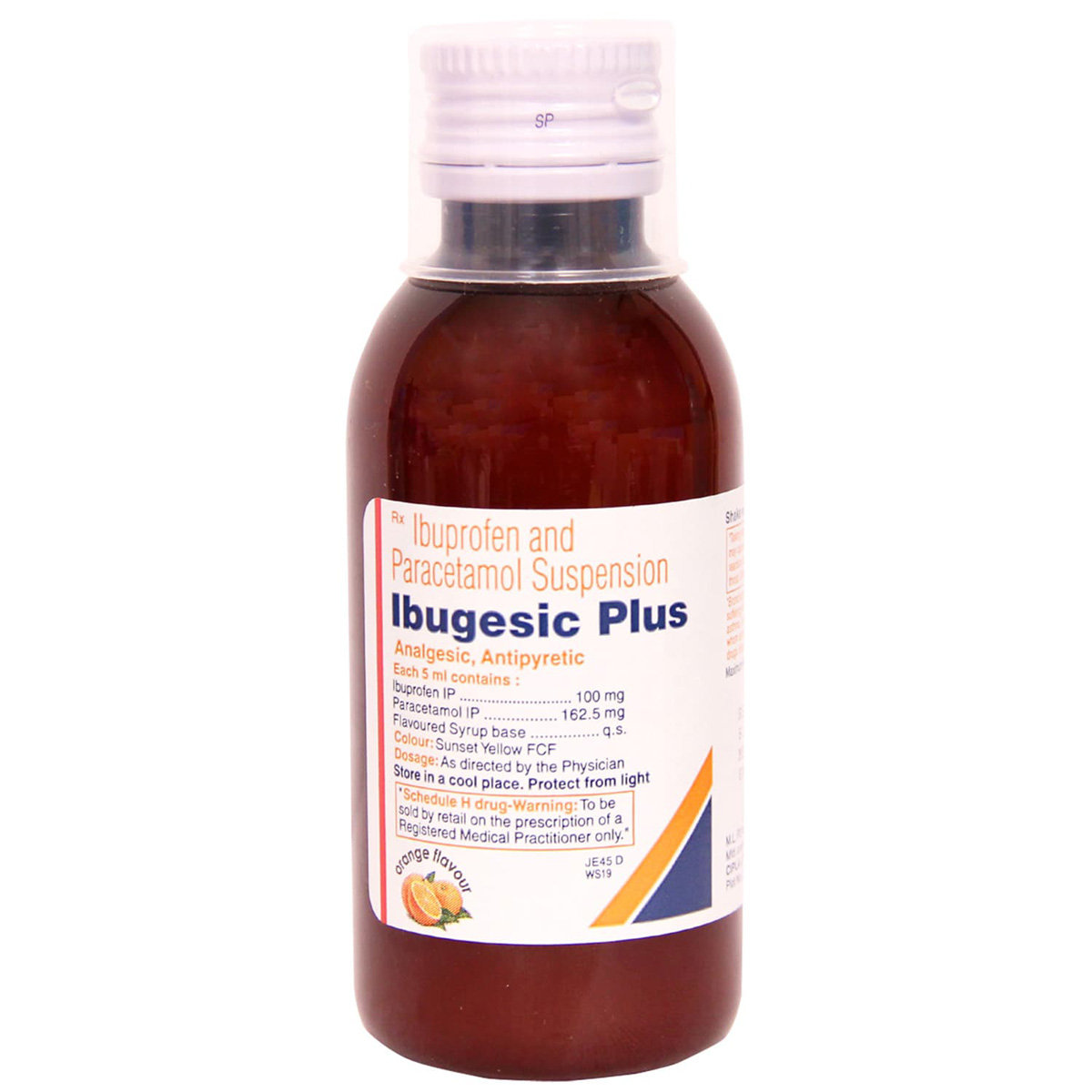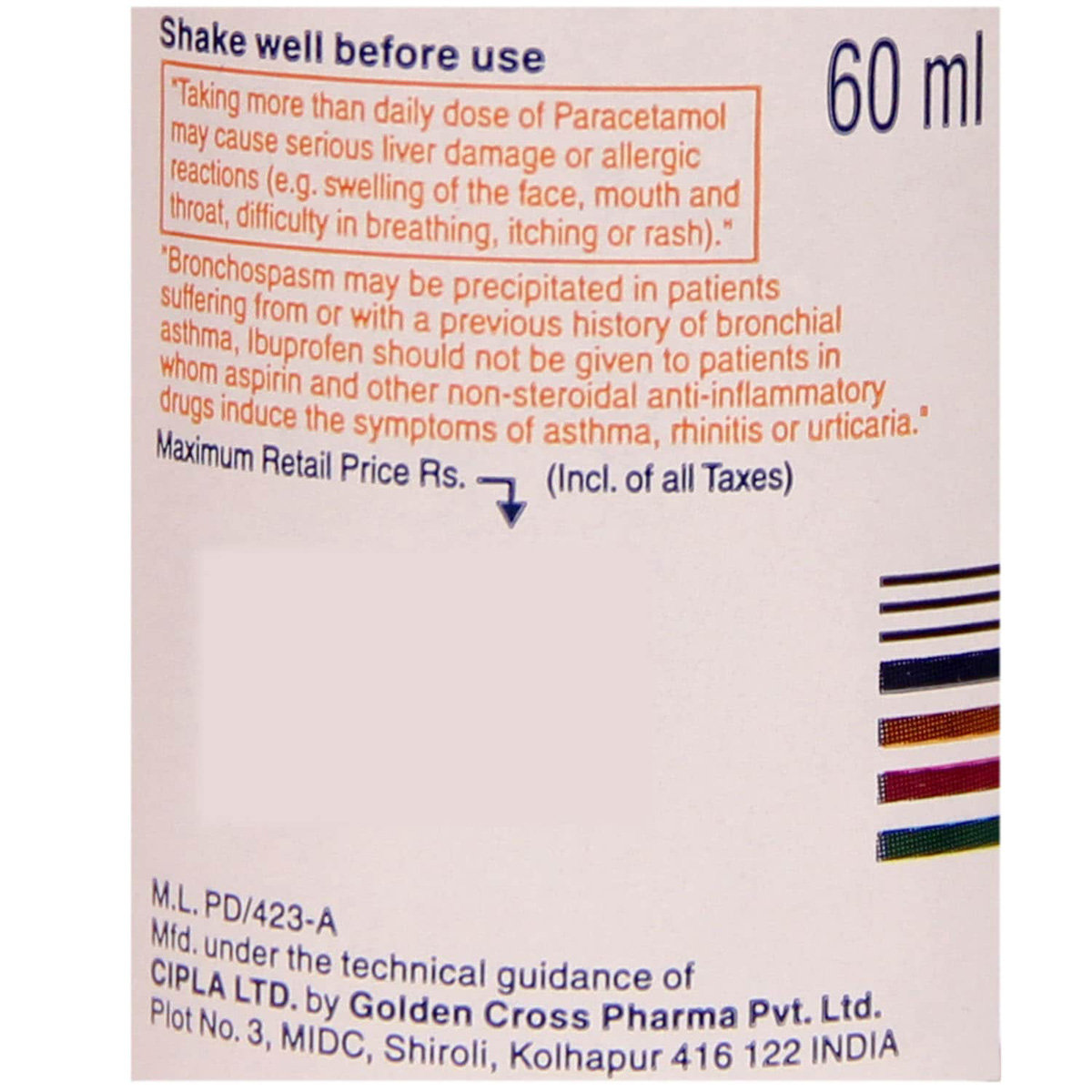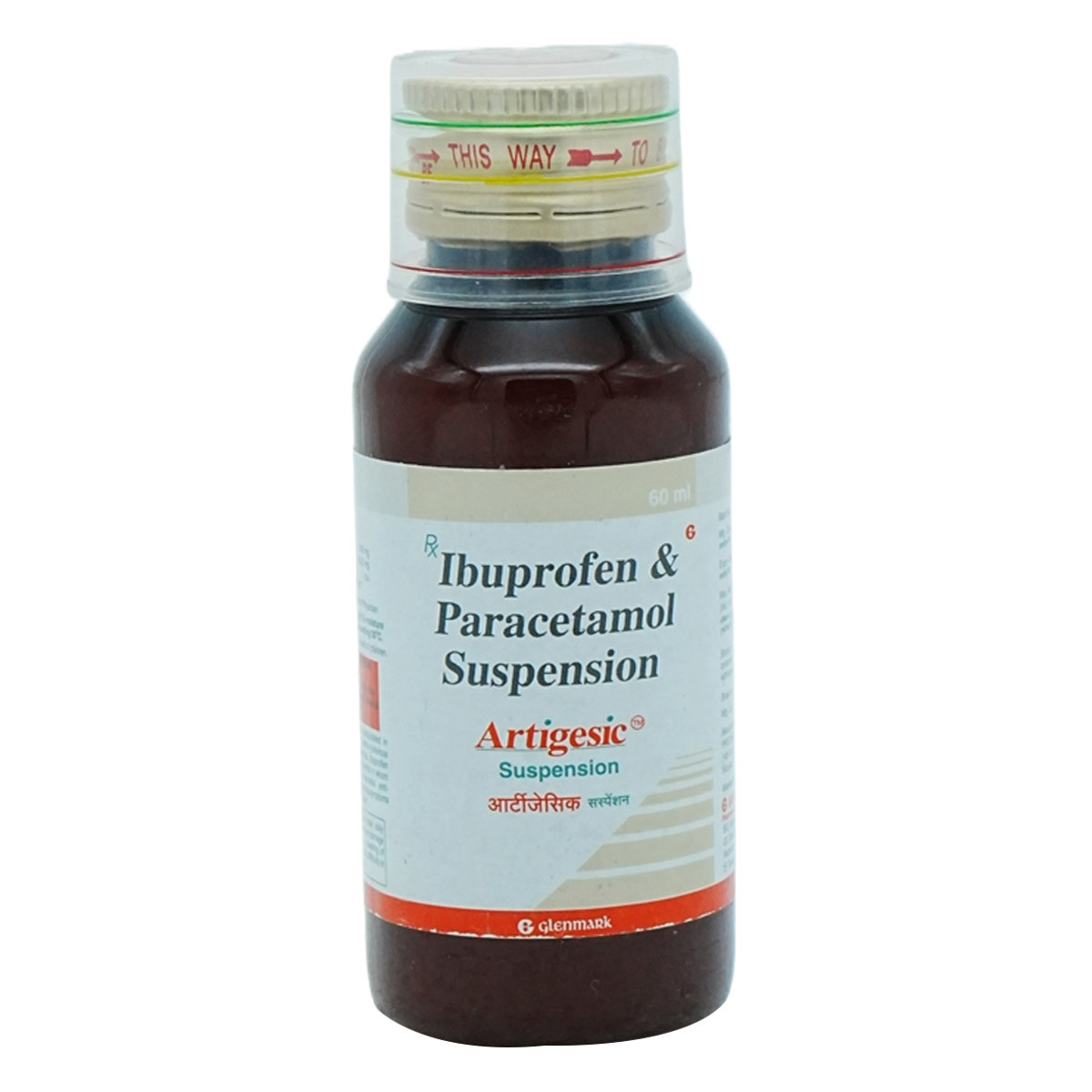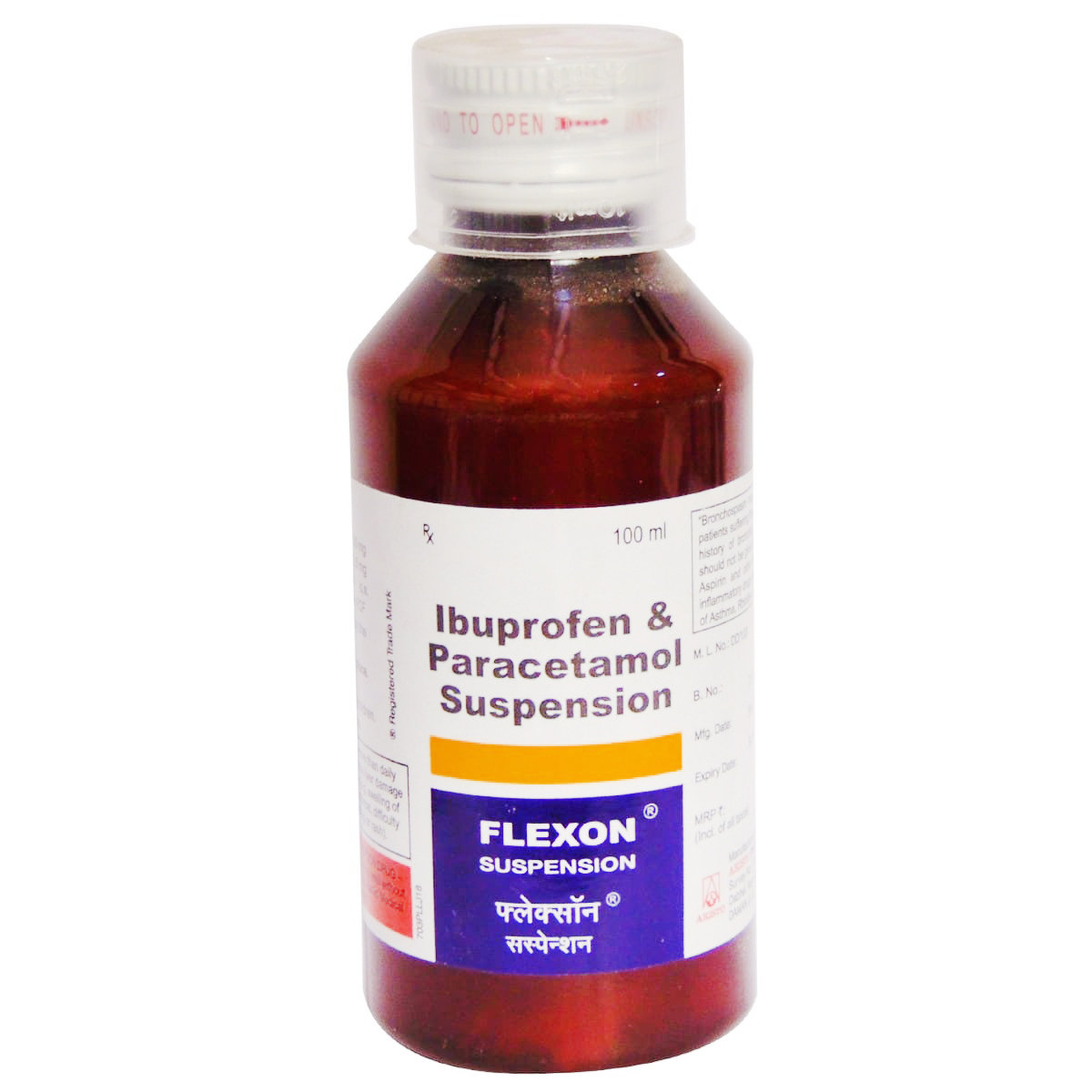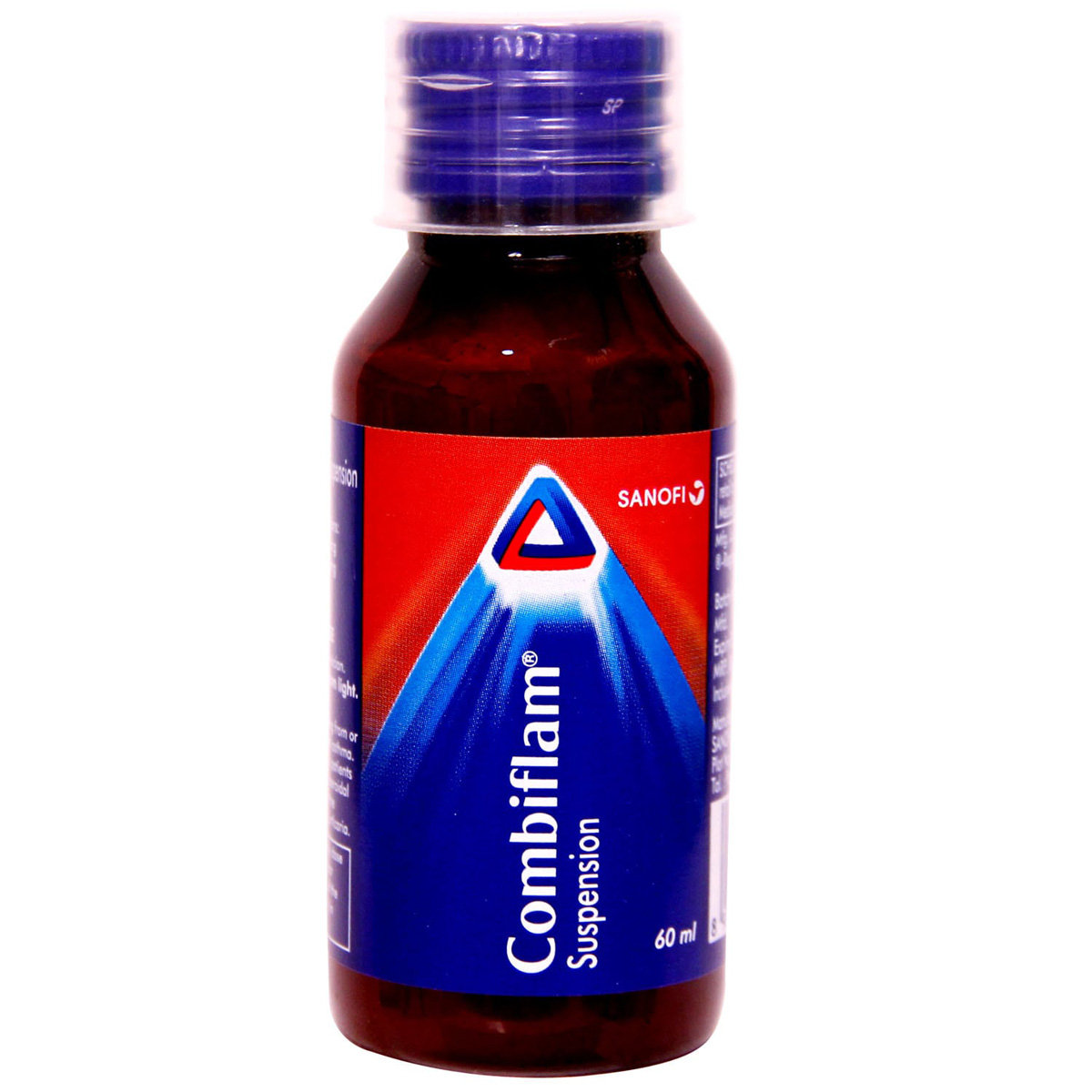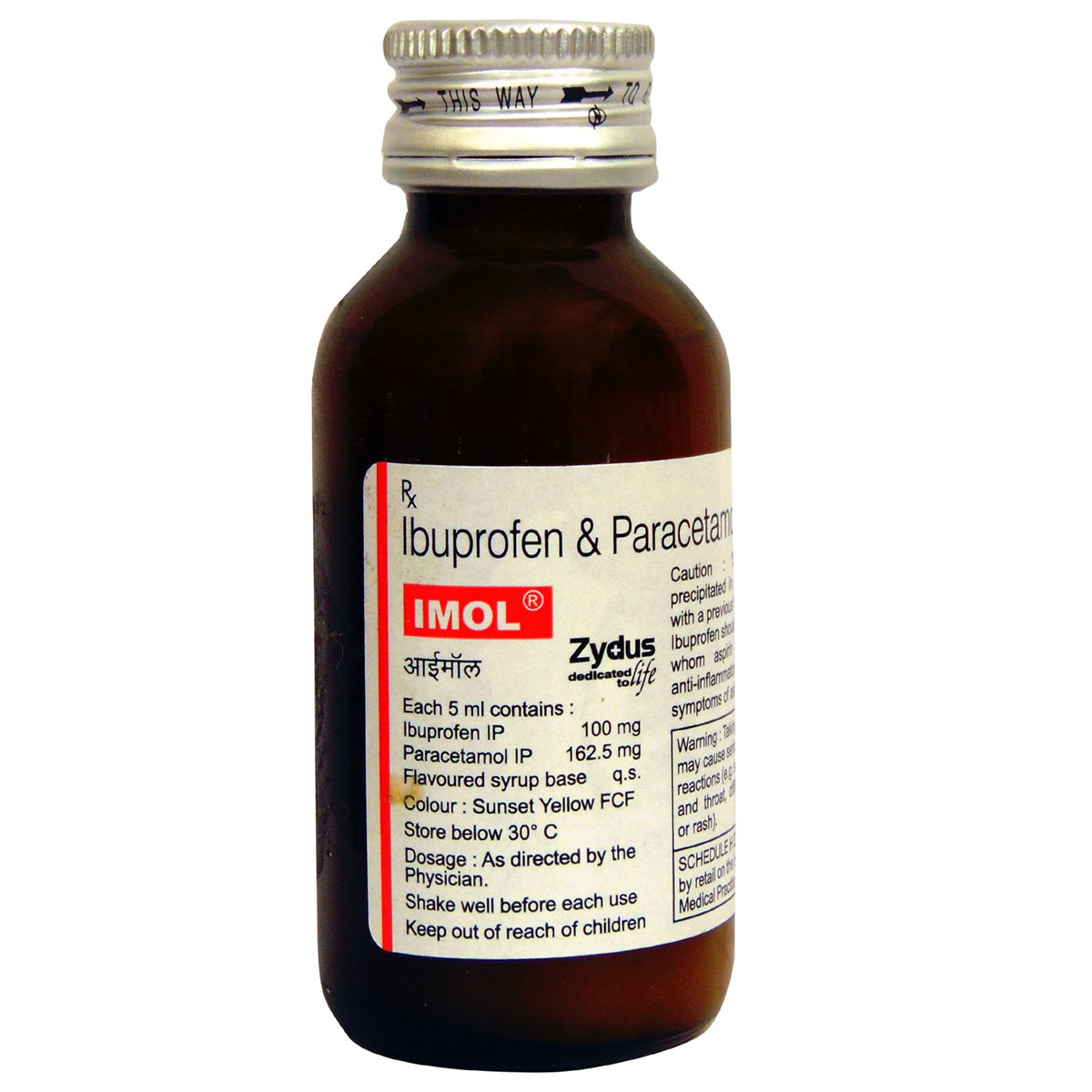Ibugesic Plus Suspension 60 ml
MRP ₹44.5
(Inclusive of all Taxes)
₹6.7 Cashback (15%)
Selected Flavour Fragrance:Unflavoured
- Unflavoured
- Strawberry
Selected Pack Size:60 ml
60 ml ₹40.1
(₹0.67 per ml)
In Stock
Provide Delivery Location
Online payment accepted
 Prescription drug
Prescription drugWhats That
Composition :
Manufacturer/Marketer :
Consume Type :
Expires on or after :
Return Policy :
About Ibugesic Plus Suspension
Ibugesic Plus Suspension belongs to a class of painkillers called non-steroidal anti-inflammatory drugs (NSAIDs). It relieves symptoms of muscle pain, arthritis pain, dysmenorrhea (painful periods or menstrual cramps), and dental pain and reduces fever. Pain can be temporary (acute) or long-lasting (chronic). Acute pain is for a short time caused by damage to the tissues of the muscle, bone, or other organs. In contrast, chronic pain lasts for a long duration and is caused due to pathologies like nerve damage, osteoarthritis etc. Besides this, it is also useful for dental pain, which can occur due to damage to the tooth nerve, infection, decay, extraction or injury.
Ibugesic Plus Suspension is composed of two medicines, namely Ibuprofen and Paracetamol. Ibuprofen is known to have an analgesic and anti-inflammatory effect for reducing mild to moderate pain. It works by blocking the effect of a chemical known as prostaglandin, responsible for inducing pain and inflammation in our body. Paracetamol acts as a mild analgesic and antipyretic (fever reducer). It lowers the elevated body temperature and mild pain by inhibiting the synthesis of a chemical messenger (prostaglandin) and promoting heat loss (through sweating) that helps reset the hypothalamic thermostat. Together, these two medicines help reduce mild to moderate pain in a shorter duration.
Ibugesic Plus Suspension is available in both oral tablet and syrup dosage forms. You should take the syrup form of Ibugesic Plus Suspension with food or as your doctor advises. The tablet form of Ibugesic Plus Suspension should be swallowed whole with a glass of water. Do not crush, chew or break it. Do not take Ibugesic Plus Suspension if your pain lasts more than ten days or your fever lasts more than three days. Do not take a double dose if you missed one dose. Like all medicines, Ibugesic Plus Suspension may cause side effects, although not everybody gets them. Stop taking this medicine if you experience symptoms like the tightness of the chest, breathing difficulties, fever, skin rashes, increased heart rate and or in case of any signs of hypersensitivity.
Do not take Ibugesic Plus Suspension if you are allergic to painkillers like aspirin, ibuprofen, naproxen, or diclofenac. It is not recommended for use in children, people with liver disease, heart disease or gastric ulcers/bleeding problems. Ibugesic Plus Suspension may be associated with a small increase in the risk of heart attack (myocardial infarction). Avoid consumption of alcohol as it may damage your liver and cause increased side effects on taking this drug. Consult your doctor if your pain, inflammation, and fever symptoms do not disappear even after ten days.
Uses of Ibugesic Plus Suspension
Directions for Use
Key Benefits
Ibugesic Plus Suspension comprises Ibuprofen and Paracetamol primarily used to treat mild to moderate pain. Ibugesic Plus Suspension is prescribed mainly to treat pain and relieve discomfort caused by conditions like tooth pain, arthritis, period pain and other types of short-term pains. It helps treat pain by blocking the chemical messenger (prostaglandin) in the brain responsible for causing pain. Ibuprofen works by blocking the effect of a chemical known as prostaglandin, responsible for inducing pain and inflammation in our body. On the other hand, Paracetamol lowers the elevated body temperature and mild pain by inhibiting the synthesis of prostaglandin by promoting heat loss (through sweating) that helps reset the hypothalamic thermostat. Paracetamol has the advantage of producing less gastric irritation than other painkillers like aspirin.
Storage
- You can try over-the-counter antacid medications for quick relief from heartburn, but ask your doctor before using them.
- Keep a healthy weight and do not wear tight clothes to avoid putting extra pressure on your stomach, which can cause acid reflux and worsen heartburn.
- Avoid consuming food or drinks that can trigger heartburn, like citrus, tomatoes, garlic, alcohol, coffee, peppermint, and spicy or fatty foods.
- Do not lie down for at least 2-3 hours after meals.
- Quit smoking and avoid eating late at night.
- Try having smaller meals more often instead of large ones.
- Drink water or other clear fluids.
- To prevent worsening of pain, limit intake of tea, coffee, or alcohol.
- Include bland foods like rice, toast, crackers, and rice in your diet.
- Avoid lying down immediately after eating as it may cause indigestion or heartburn.
- Avoid acidic and spicy food as it may cause indigestion.
- Take medications with food (if recommended): It can help prevent stomach distress and indigestion.
- Eat smaller, more frequent meals: Divide daily food intake into smaller, more frequent meals to ease digestion.
- Avoid trigger foods: Identify and avoid foods that trigger indigestion, such as spicy, fatty, or acidic foods.
- Stay upright after eating: Sit or stand upright for at least 1-2 hours after eating to prevent stomach acid from flowing into the oesophagus.
- Avoid carbonated drinks: Avoid drinking carbonated beverages, such as soda or beer, which can worsen indigestion.
- Manage stress: To alleviate indigestion, engage in stress-reducing activities like deep breathing exercises or meditation.
- Consult a doctor if needed: If indigestion worsens or persists, consult a healthcare professional to adjust the medication regimen or explore alternative treatments.
- Tell your doctor about your GAS symptoms. They may change your medication regimen or prescribe additional drugs to help you manage them.
- To manage GAS symptoms, eat a balanced diet of fibre, vegetables, and fruits.
- Drink enough water throughout the day to avoid constipation and treat GAS symptoms.
- Regular exercise like yoga and walking may help stimulate digestion and alleviate GAS symptoms.
- Take probiotics only if your doctor advises, as they may help alleviate GAS symptoms by promoting gut health.
- Take medication for GAS symptoms only if your doctor advises, as certain medications can interact with your existing prescriptions or worsen symptoms.
- If symptoms persist, worsen, or are accompanied by severe abdominal pain, vomiting, or bleeding, seek immediate medical attention.
- Inform Your Doctor: Notify your doctor immediately about your diarrhoea symptoms. This allows them to adjust your medication or provide guidance on managing side effects.
- Stay Hydrated: Drink plenty of fluids to replace lost water and electrolytes. Choose water, clear broth, and electrolyte-rich drinks. Avoid carbonated or caffeinated beverages to effectively rehydrate your body.
- Follow a Bland Diet: Eat easy-to-digest foods to help firm up your stool and settle your stomach. Try incorporating bananas, rice, applesauce, toast, plain crackers, and boiled vegetables into your diet.
- Avoid Trigger Foods: Steer clear of foods that can worsen diarrhoea, such as spicy, fatty, or greasy foods, high-fibre foods, and dairy products (especially if you're lactose intolerant).
- Practice Good Hygiene: Maintain good hygiene to prevent the spread of infection. To stay healthy, wash your hands frequently, clean and disinfect surfaces regularly, and avoid exchanging personal belongings with others.
- Take Anti-Diarrheal Medications: If your doctor advises, anti-diarrheal medications such as loperamide might help manage diarrhoea symptoms. Always follow your doctor's directions.
- Keep track of your diarrhoea symptoms. If they don't get better or worse or are accompanied by severe stomach pain, blood, or dehydration signs (like extreme thirst or dark urine), seek medical help.
- Inform your doctor about your constipation symptoms. They may adjust your medication or advise alternative treatments.
- Stay hydrated by drinking sufficient of water (at least 8-10 glasses a day) to help soften stool and promote bowel movements.
- Increase fibre intake by eating foods high in fibre, such as fruits, whole grains, vegetables and legumes, to help bulk up the stool.
- Establish a bowel routine by trying to go to the bathroom at the same time each day to train your bowels.
- Engaging in regular exercise, like walking or yoga, can support in bowel movement stimulation.
- Consult your doctor if constipation persists, and discuss alternative treatments or adjustments to your medication.
Drug Warnings
Caution is advised in people with underlying sensitivity to aspirin and other pain killers. Ibugesic Plus Suspension is contraindicated in children below 12 years of age under 40 kg of weight. If treatment is required for more than three days, consult your doctor. Ibugesic Plus Suspension should be taken with caution if you have an allergy to paracetamol, ibuprofen, aspirin, or other pain killers, highly sensitive reactions (asthma, lip/face/throat swelling), existing stomach ulcer or bleeding associated pain killers, blood clotting disorder, heart diseases (like congestive heart failure), kidney disease, peptic ulcer, another active bleeding (like brain stroke bleeding), and severe dehydration (due to vomiting, diarrhoea). Liver damage might occur if taken for a longer duration as it contains paracetamol. The skin should be closely monitored as skin allergic reactions like Stevens-Johnson syndrome (SJS), and toxic epidermal necrolysis (TEN) have been reported with Ibugesic Plus Suspension. Blood pressure and cardiovascular (heart) status should be monitored closely during the treatment with Ibugesic Plus Suspension, especially in people affected with high blood pressure and who have a history of heart failure.
Drug-Drug Interactions
Drug-Drug Interactions
Login/Sign Up
Taking Ketorolac and Ibugesic Plus Suspension 60 ml can increase the risk of side effects in the gastrointestinal tract such as inflammation, bleeding and ulceration.
How to manage the interaction:
Taking Ketorolac and Ibugesic Plus Suspension 60 ml together is not recommended as it can lead to an interaction, it can be taken if advised by your doctor. However, if you experience any symptoms like dizziness, lightheadedness, red or black, dark stools, coughing or vomiting fresh or dried blood that looks like coffee grounds, severe headache, and weakness, consult the doctor immediately. Do not stop using any medications without a doctor's advice.
Combining Meloxicam and Ibugesic Plus Suspension 60 ml can increase the risk of side effects in the gastrointestinal tract such as inflammation, bleeding, ulceration, and rarely, perforation.
How to manage the interaction:
Taking Meloxicam and Ibugesic Plus Suspension 60 ml together is not recommended as it can lead to an interaction, it can be taken if advised by your doctor. However, if you experience any symptoms like dizziness, lightheadedness, red or black, dark stools, coughing or vomiting fresh or dried blood that looks like coffee grounds, severe headache, and weakness, consult the doctor immediately. Do not stop using any medications without a doctor's advice.
Co-administration of Ibugesic Plus Suspension 60 ml may decrease the excretion rate of Oxazepam which could result in a higher serum level.
How to manage the interaction:
Although there is a possible interaction between Oxazepam and Ibugesic Plus Suspension 60 ml, you can take these medicines together if prescribed by a doctor. Do not stop using any medications without a doctor's advice.
Co-administration of ketamine and Ibugesic Plus Suspension 60 ml may decrease the effectiveness of Ketamine which could result in a higher blood level.
How to manage the interaction:
Although taking Ketamine and Ibugesic Plus Suspension 60 ml together can evidently cause an interaction, it can be taken if a doctor has suggested it. If you're feeling very sleepy or having trouble breathing, it's important to contact your doctor right away. Do not stop using any medications without a doctor's advice.
Co-administration of Teriflunomide with Ibugesic Plus Suspension 60 ml may increase the risk or severity of Liver problems.
How to manage the interaction:
Taking Ibugesic Plus Suspension 60 ml with Teriflunomide together can possibly result in an interaction, but it can be taken if a doctor has advised it. Do not discontinue any medications without consulting a doctor.
Co-administration of Ibugesic Plus Suspension 60 ml and Ketoconazole may increase the risk of liver injury.
How to manage the interaction:
Although there is a possible interaction between Ibugesic Plus Suspension 60 ml and Ketoconazole, you can take these medicines together if prescribed by a doctor. However, if you have joint pain or swelling, fever, chills, unusual bleeding or bruising, skin rash, itching, over-tiredness, nausea, vomiting, loss of appetite, stomach pain, dark-colored urine, light-colored stools, and/or yellowing of the skin or eyes, contact a doctor immediately as these may be signs and symptoms of liver damage. Do not discontinue the medication without consulting a doctor.
Co-administration of Ibugesic Plus Suspension 60 ml and Leflunomide may increase the risk of liver problems.
How to manage the interaction:
Although there is a possible interaction between Ibugesic Plus Suspension 60 ml and Leflunomide, they can be taken together if prescribed by a doctor. However, if you experience fever, chills, joint pain or swelling, unusual bleeding or bruising, skin rash, itching, less desire to eat, fatigue, nausea, vomiting, abdominal pain, or yellowing of the skin or eyes, contact a doctor immediately. Do not discontinue any medications without consulting a doctor.
Co-administration of Ibugesic Plus Suspension 60 ml and Valdecoxib may increase the risk or severity of adverse effects.
How to manage the interaction:
Although there is a possible interaction between Ibugesic Plus Suspension 60 ml and Valdecoxib, you can take these medicines together if prescribed by a doctor. However, if the side effects worsen, please consult a doctor.
Co-administration of Lomitapide and Ibugesic Plus Suspension 60 ml may increase the risk of severity of liver injury.
How to manage the interaction:
Although there is a possible interaction between Ibugesic Plus Suspension 60 ml and Lomitapide, you can take these medicines together if prescribed by a doctor. Do not stop using any medications without a doctor's advice.
Co-administration of Mipomersen with Ibugesic Plus Suspension 60 ml may increase the risk or severity of liver injury.
How to manage the interaction:
There may be a possibility of interaction between Ibugesic Plus Suspension 60 ml and Mipomersen, but it can be taken if prescribed by a doctor. Do not stop using any medications without talking to a doctor.
Drug-Food Interactions
Drug-Food Interactions
Login/Sign Up
Diet & Lifestyle Advise
- Include more glucosamine, chondroitin sulphate, vitamin D, and calcium-enriched supplements. Besides this, turmeric and fish oils can help reduce inflammation in the tissue.
- Please do not go for heavy exercise as it may increase your joint pain in arthritis. Instead, you can do low-impact aerobic exercises like walking on the treadmill, bike riding and swimming. You can also strengthen your muscles by lifting light weights.
- In the chronic condition of arthritis or joint pain, try to include fish like salmon, trout, tuna, and sardines. These fishes are enriched with omega-3 fatty acids that minimum level of chemical called cytokines, which ramp up inflammation.
- Your sitting posture is important, especially when you have pain and inflammation. Try to sit as little as possible and only for a short time. Long-term immobility is harmful in conditions like arthritis. Use back support like a rolled-up towel to minimise pain at the back of your spine curve. Keep your knees and hips at a right angle. Besides this, you can also use a footrest if required.
Side Effects of Ibugesic Plus Suspension
- Nausea
- Vomiting
- Diarrhoea
- Flatulence
- Constipation
- Thrombocytopenia (low level of platelets)
- Neutropenia/leucopenia (low white blood cells)
- Skin rashes (urticaria)
- Peptic ulcers
- Gastrointestinal bleeding
- Dyspepsia
- Abdominal pain
- Colitis (inflammation of the intestine)
- Inflammatory bowel disorder
Habit Forming
Therapeutic Class
All Substitutes & Brand Comparisons
RX
Out of StockBruace Suspension
Jagsonpal Pharmaceuticals Ltd
₹51.87
(₹0.1/ 1ml)
85% CHEAPERRX
Out of StockBren Plus 100 mg/162.5 mg Suspension
₹12.47
(₹0.19/ 1ml)
71% CHEAPERRX
Out of StockChildren's Combipain Suspension Orange
Scott Edil Pharmacia Ltd
₹16.2
(₹0.24/ 1ml)
64% CHEAPER
Drug-Diseases Interactions
Drug-Diseases Interactions
Login/Sign Up
FAQs
Drug-Drug Interactions Checker List
- WARFARIN
- TICLOPIDINE
- METHOTREXATE
- METOCLOPRAMIDE
- DOMPERIDONE
- FUROSEMIDE
- PREDNISONE
- CIPROFLOXACIN
- THEOPHYLLINE
- EPHEDRINE
- CHOLESTYRAMINE
- DULOXETINE
Special Advise
- Let your doctor know if you are suffering from stomach ulcers as the Ibugesic Plus Suspension may enhance the same.
Disease/Condition Glossary
Pain: Pain can be short-term (acute) or long-term (chronic). Acute pain is for a short time caused by damage to the tissues of the muscle, bone, or organs. In contrast, chronic pain lasts for a longer duration. It is caused due to pathologies like nerve damage, Osteoarthritis, and dental pain due to damage to the tooth nerve, infection, decay, extraction, or injury. Many women have painful periods known as dysmenorrhea, most often menstrual cramps. On the other hand, Osteoarthritis is a degenerative disease that results in chronic pain in joints (especially the knee) and stiffness making daily tasks difficult.
Fever: Fever is not a disease but a sign that your body is trying to fight an infection or illness in which your body's immune system gets activated to fight infections caused by bacteria or viruses. A normal temperature is around 98.6 F but may vary from person to person. Fever is caused due to the 'pyrogen' released by the hypothalamus part of the brain. This pyrogen causes heat-generating effects to match a new higher temperature set point to fight infection.

Have a query?
Alcohol
Safe if prescribed
Taking Ibugesic Plus Suspension with alcohol may cause dizziness or drowsiness. Besides this, it can also damage your liver if taken for a longer duration. So, avoid or limit intake of alcoholic beverages with Ibugesic Plus Suspension.
Pregnancy
Consult your doctor
Use of Ibugesic Plus Suspension during pregnancy is not recommended as taking this medicine during the last 3 months of pregnancy may harm the unborn baby.
Breast Feeding
Consult your doctor
Take Ibugesic Plus Suspension only if prescribed by your doctor.
Driving
Safe if prescribed
After taking Ibugesic Plus Suspension you may notice dizziness, sleepiness, drowsiness or fatigue as it contains paracetamol which causes sedation. So, in this, you should stop taking Ibugesic Plus Suspension and contact your doctor.
Liver
Consult your doctor
Ibugesic Plus Suspension to be taken with caution, especially if you have a history of liver disease. Dose may have to be adjusted by your doctor.
Kidney
Consult your doctor
Ibugesic Plus Suspension to be taken with caution, especially if you have a history of Kidney diseases/conditions. Dose may have to be adjusted by your doctor.
Children
Safe if prescribed
Ibugesic Plus Suspension is contraindicated in children below 20 kg body weight or younger than 6 years of age. It may cause kidney problems in children and adolescents who are dehydrated.

